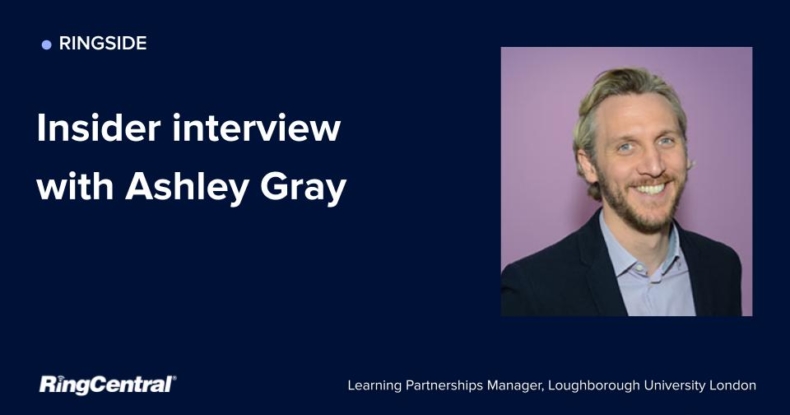Ringside welcomes views from within and outside our team, especially those we partner with on forward-thinking initiatives. This time, we caught up with Ashley Gray, the learning partnerships manager at Loughborough University London.
Many industries have gone through so much change. Higher education is no different. When students and faculty members alike were sent to learn and work remotely, they quickly adapted to new virtual learning environments. Lectures, seminars and initiatives all had to find their way online somehow. Ashley tells us his experiences during this time and trends that have emerged due to the change. You can watch the full interview below or carry on reading for key takeaways.
Could you tell us about Loughborough University London and the Collaborative Project?
Loughborough University London is a postgraduate campus based over at Olympic Park in London. It’s got an innovation and enterprise focus. The Collaborative Project is a module that empowers all students to develop knowledge through experiential learning. 700 students this year will collaborate with external partner organisations on live briefs. We have 700 students and 28 different project briefs pioneering the future of what these organisations might want to be involved with or develop in the years to come.
What’s your role, and what do you love most about it?
My role at Loughborough University London is to lead the Collaborate programme. So there’s the collaborative project and the collaborative dissertation, which is a follow on from the collaborative project whereby students get to work optionally as an individual working with an external partner organisation. My role is to find these interesting, exciting partners such as RingCentral and help create these projects for students.
I get to speak to so many great organisations looking to change the future and make a positive impact. Equally, I love the opportunity to see how our students come together as teams and have this industry exposure. This allows them to showcase what they’re capable of and apply the knowledge they’re gaining during their master’s degrees. Through the programme, students equip themselves with skills that can get them straight into employment and be that next star employee for some of them.
How has the pandemic impacted the way you work, and how have you (as a university) overcome these challenges?
Like many other organisations, we had to go digital overnight. Fortunately, we were founded just over five years ago now. So there’s a lot of our staff members that are well equipped and dynamic. A kind of startup mentality runs through this university. So we’re able to take that culture and apply it successfully in this new environment. We already had an internal digital platform that we’re using anyway because we collaborate quite closely with our Midlands campus.
We recognised that students couldn’t interact in person, which is such a big part of uni life. So we’ve held a lot more virtual events to try to create that culture. What we’ve seen since is interesting. We’ve had so much more engagement than we might normally get.
It’s also been great for our collaborators because they found it easier to work with us. Some of them are overseas, so holding virtual events meant they didn’t have to jump on a plane.
Have you spotted any innovative announcements, trends or initiatives in higher education?
The growth of upskilling
Education is in a really interesting place right now. Only recently, Google certifications came online. This created more opportunities for people to upskill through subscription and progress their lives, whether in their careers or pivoting. The platform that hosts these certifications, Coursera, just went public. Its usage grew by 350% last year. I think that equates to about 21 million additional people during a Coursera course. All of this shows how popular virtual learning has become this past year.
Collaboration with partners
I hope there will be more integration with higher ed institutions because that fundamental knowledge has to come from somewhere. I’d like to think that universities will play a significant part in rolling out smaller courses available to larger demographics.
The Collaborative Project operated so well virtually that we want to see how we could take it out of the traditional classroom in the future. Something we’re piloting this summer is working with school-aged children. 14 and 15 year-olds are going to try the project. This will be a shortened version and somewhat modified, but we’re experimenting to see if it works and how to adapt it if needed. This could be something that our partners could get involved with going forward.
Originally published May 11, 2021, updated May 12, 2021

